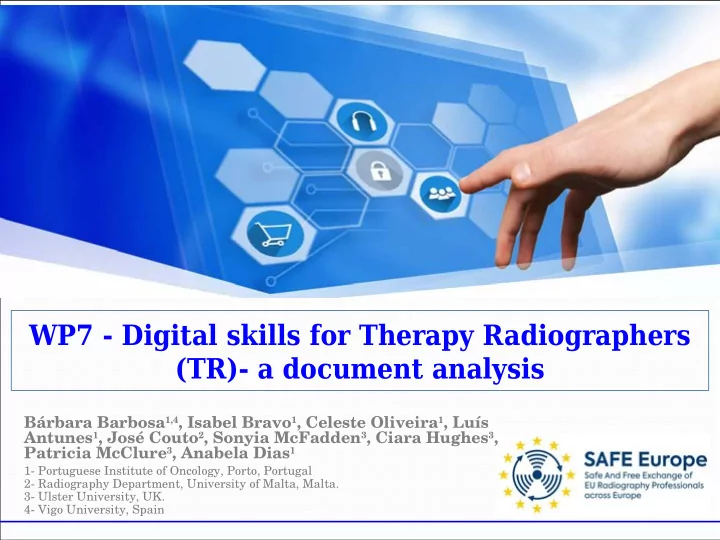

WP7 - Digital skills for Therapy Radiographers (TR)- a document analysis Bárbara Barbosa 1,4 , Isabel Bravo 1 , Celeste Oliveira 1 , Luís Antunes 1 , José Couto 2 , Sonyia McFadden 3 , Ciara Hughes 3 , Patricia McClure 3 , Anabela Dias 1 1- Portuguese Institute of Oncology, Porto, Portugal 2- Radiography Department, University of Malta, Malta. 3- Ulster University, UK. 4- Vigo University, Spain
Disclaimer The European Commission's support for the production of this publication does not constitute an endorsement of the contents, which reflect the views only of the authors, and the Commission cannot be held responsible for any use which may be made of the information contained therein. 2
Background EU Digital skills agenda Digital Skills for TRs Literature review Methodology Results ● Discussion/Conclusion Future directions
EU Digital Skills agenda “Digital skills and related concepts, such as digital competence, have become key terms in the discussion on the kind of skills needed by citizens – in Europe and beyond – to participate and thrive in our society…” European Commission 2010; Ferrari 2012; Gallardo-Echenique et al. 2015
And Digital Skills for TRs? ● Key role in health care provision ● New technological challenges (diversity of software) ● Role expansion and shift of responsibilities https://www.coventrytelegraph.net/lifestyle/nostalgia/gallery/old-news -sports-photos-taken-11295826 https://www.itnonline.com/content/establishing-igrt-program -observations-two-treatment-centers
Digital Skills for TRs I just told you that there is no What???? common regulation for that, yet !!! Aim: A ssess the literature and identify the relevant digital skills for Trs.
Methodology Systematic search: ✔ Databases and Journals: ✔ PMC ✔ Science Direct ✔ ERIC ✔ Cochrane Library ✔ PubMed.gov ✔ IEEE Xplore ✔ Radiography Journal Query: ✔ TipsRO Journal ✔ Zotero Software (digital) AND (competenc* OR task* OR skill*) AND ✔ Two reviewers (“therapeutic radiographer” OR “therapeutic radiography” OR radiographer* OR radiotherapist* OR RTT* OR “radiation therapist” OR “radiation technologist” OR “radiation therapy technician” OR “Radiological technologist” OR “Radiological technician”) AND (radiotherapy OR “radiation therapy” OR “radiation oncology”)
Literature Selection Process Database search Database search (n=216) (n=216) Duplicates records Duplicates records removed (n=12) Inclusion criteria: removed (n=12) • 10 year period Records screened Records screened • Languages: EN/PT (n=204) (n=204) Records excluded • Focus on TR’s digitals skills Records excluded after review of after review of abstract abstract (n=172 ) Full-text articles (n=172 ) Full-text articles assessed for assessed for Exclusion criteria: eligibility (n=32) • eligibility (n=32) Focus on digital skills of Full-text articles Full-text articles other healthcare excluded (n=14) excluded (n=14) professionals • Full –text articles Irrelevancy to the topic of Full –text articles included (n=18) research included (n=18) Articles added Articles added through snowballing through snowballing (n=8 ) (n=8 ) Studies included Studies included (n=26 ) (n=26 )
Methods Radiotherapy ✔ Benchmarking documents ✔ Recommendations documents ✔ Educational guidelines Digital skills/competencies ✔ EU’ Digital Programmes ✔ European projects (reports) ✔ International frameworks Technical Publications ✔ User guide manuals ✔ Reference guide manuals
Results I can’t find anything!
Results Planning Image Management and Research T Planning reatment Transversal Quality, Safety and Risk reatment Management T
T ransversal Planning Image T reatment Planning • • • Plan treatment Technologies/ Information Computerized Tomography • • Systems (IS) Plan parameters 4D Computerized • • Dose calculation Communication Tomography • • • Inverse planning Electronic Patient Record Image Processing and (EPR) (IMRT/VMAT) Enhancement • • • 4D planning Patient Agenda Image Registration and • • Workstation SRS/SBRT planning Correlation • • Plan evaluation Image Segmentation and • Prerequisites for treatment Contouring Quality, Safety and Management and T reatment Research Risk Management • • • System setup Department Quality assurance • • Treatment delivery planning administration and Security • Treatment verification: • Risk management management • conventional techniques • Data protection Education and research • • Treatment verification: Information integrity advanced techniques • Image matching • Image analysis • Treatment delivery • Respiratory gating treatment delivery • SRS/SBRT treatment delivery
Results 6 Dimensions 202 Digital Skills 34 Sub- Dimensions
Results • Use an internal communication channel • Transversal Communication Create multimedia content for patient education Computerized • Create scan protocols Planning Image • Set acquisition parameters Tomography Treatment • Select calculation parameters Dose Calculation • Calculate dose distribution Planning • View online/offline images Image analysis Treatment • Use analysis tools • Record all procedures concerning the Quality, Safety and radiation delivered Security • Review LINAC, MLC and imaging Risk Management system failures/interlocks Education and Management and • Use data analysis software • Create training programs Research research
Conclusions TRs needs to deal with the digital revolution! Digital skills are already in use in daily practice! Ensure that TRs are trained with the necessary skills (from early education to CPD), to adopt the best practice across Europe. Closing the digital skills gaps will improve the quality of practice which will result in better patient outcomes. TRs must have a good level of digital skills, or risk losing autonomy and influence. Make TRs co-developers of digital solutions for Radiotherapy workflow. This set of digital skills will also allow for the anticipation of future needs, regarding the new technologies (such as machine learning, big data and cybersecurity).
Future directions - WP7 Survey distribution (Europe) Focus group interviews - design Recommendations and webinars
Conclusions January 2020
“Digital skills require the mastery of particular relatively complex operations, interfaces, and applications of digital technology…Thus, digital skills are a complex policy problem that calls for both technological and educational solutions.” Van Dijke, 2014
Recommend
More recommend